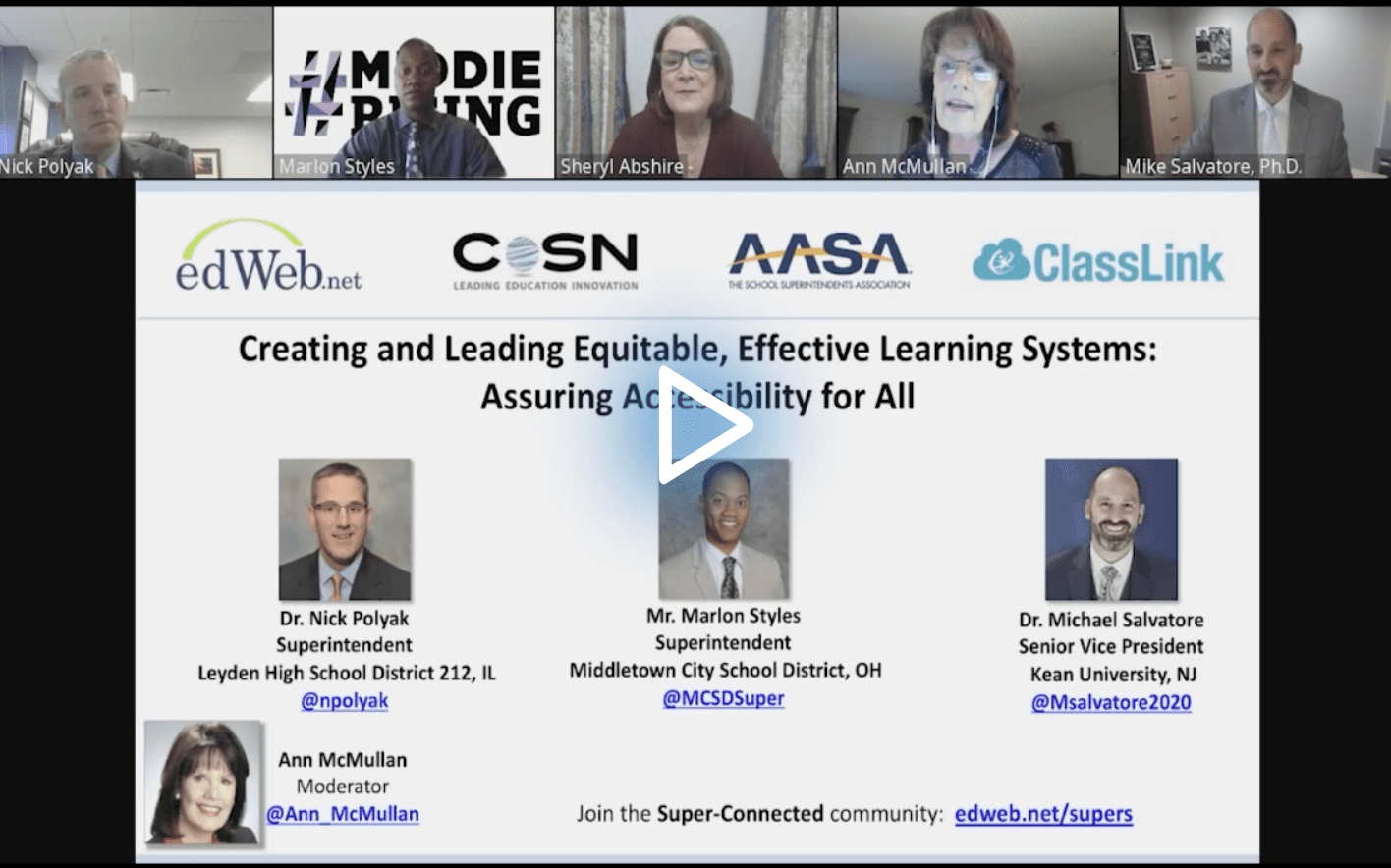Creating and Leading Equitable, Effective Learning Systems
Looking through the lens of three district leaders, a recent edWebinar, sponsored by ClassLink and co-hosted by CoSN and AASA, highlighted how school districts are working with their staff and students to assure accessibility for all. The presenters discussed and reflected on five compelling steps that school districts must take to ensure accessibility.
Step 1: Stay Current with State and Federal Legislation
With numerous state and national legislative representatives that serve school districts across the country, district leaders such as Dr. Nick Polyak, Superintendent of Leyden High School District 212 (IL), believe building relationships is key to staying current and connected to state and federal legislation. “I just want to get to know them and find out what our schools can do to support the work they are doing.” Dr. Michael Salvatore, Senior Vice President of Kean University (NJ), agrees with the strategy to personalize the process. “If we can develop the relationship early on with our local and state representative before the bill is enacted into law, we can have a voice in the process.” Marlon Styles, Superintendent of Middletown City School District (OH), recommended getting into the game early by being intentional about participation in networks and organizations that provide access to information that is a priority for the district.
Step 2: Develop and Communicate a Districtwide Policy for Accessibility, Including Guidelines for Accessible Purchasing
Dr. Salvatore, who is the former superintendent of Long Branch Public Schools (NJ), said, “As a superintendent, I started to realize that we had significant policies coming about, particularly around accessibility.” A straightforward approach is to make sure that districtwide policies live beyond the binder on the shelf. Styles said that when developing and communicating guidelines for accessible purchasing, it is important to include students in the process. “We seek feedback and input from students about the accessibility of the experiences, content, and activities inside the platform or the resources to get their insights.” Dr. Polyak thinks policies need to be current and are only as good as it is to the degree people know and understand them. “You have to trust your people and provide them with a process to follow, and trust that they are going to make sure kids are getting what they need.”
Step 3: Build Staff Capacity
One of the biggest challenges in creating and leading equitable learning systems is building staff capacity. Styles and Dr. Salvatore agree that people matter as they are the most significant investment as far as a conversation about technology and accessibility. They recommend building support structures such as teacher leaders to provide real-time coaching supports inside the classroom when the inception moment comes. Dr. Polyak commented, “If you want to get better and you want to help people get better, go where the intelligent people are, and sometimes they are right down the hall.”
Step 4: Conduct Regular Accessibility Audits
While data sometimes gets a bad rap, Dr. Salvatore emphasizes audits allow us to identify weaknesses and successes regarding accessibility in school districts. Audits are about growth, taking a deep dive into a district’s current practices regarding accessibility, and determining the investment in students and staff. “There is a macro audit process when you think about accessibility. It is the people who know the students the best who are coming together to say, ‘We are knowledgeable because of all the capacity building we’ve done,’” said Dr. Polyak. Styles added that the audits inform decision making and programming that establish equity priorities for the students in the school district.
Step 5: Set Expectations, Model Accountability for Accessibility
While discussing the last step, Ann McMullan, Project Director of CoSN’s EmpowerED Superintendent Initiative, asked, “If we think about the parent [or staff] community that you need to communicate with…in addition to the students, are there ways that you as a school leader would model that?” All three presenters agreed the diverse profile of each school district presents a unique opportunity to connect with the school community on what the significant issues are. Dr. Salvatore commented that there are so many underserved and underperforming students, and for their students to be successful, they must reflect on their practices and change the way they are doing business. Dr. Polyak added, “We want to launch kids out of here on that extraordinary trajectory. I need to meet families where they are to meet their kids’ needs best.”
This edWeb broadcast was sponsored by ClassLink and co-hosted by CoSN and AASA.
Watch the Recording Listen to the Podcast
About the Presenters
Dr. Nick Polyak
Dr. Nick Polyak serves as the superintendent for Leyden High School District 212 in Franklin Park, Illinois. He earned a Doctor of Education (Ed.D.) degree in educational leadership and supervision from Loyola University Chicago where he received the Phi Delta Kappa Outstanding Doctoral Dissertation Award. He holds a Master of Arts degree and Chief School Business Official (CSBO) license from Governors State University. Dr. Polyak’s undergraduate work was at Augustana College in Rock Island, Illinois, where he earned a Bachelor of Arts degree in mathematics and secondary education. Dr. Polyak is a co-moderator of #suptchat, the international Twitter chat for superintendents. He has co-authored two books: The Unlearning Leader: Leading for Tomorrow’s Schools Today and Student Voice: From Invisible to Invaluable. Dr. Polyak facilitates the AASA Transformational Leadership Consortium, the IASA Aspiring Superintendents Academy, and the AASA National Blended Aspiring Superintendents Academy.
Marlon Styles
In the fall of 2017, Marlon Styles became the proud superintendent of Ohio’s Middletown City School District. The four years prior, he served as the executive director of curriculum and instruction for Lakota Schools. His affinity for education has ignited a fiery passion to close the equity gap for all students. He prides himself on finding the good in every person. Marlon challenges others to rise up to strengthen the #MiddieRising culture. He states, “My affinity for education has ignited a fiery passion to close the equity and access gaps that affect schools. I am firmly devoted to finding innovative ways to integrate technology to transform learning experiences that will inspire students.” Marlon earned an undergraduate degree from Thomas More College and a master’s degree from the University of Cincinnati.
Dr. Michael Salvatore
Dr. Michael Salvatore currently serves as the senior vice president at Kean University and formerly as Superintendent of Long Branch Public Schools in New Jersey. He is an award-winning contemporary leader in public education with an oratory skill known to inspire thought and action. Dr. Salvatore is recognized as a federal, state, and local education advocate aiming to elevate learning institutions through promising equitable practices. He leads with a contagious collaborative spirit that sparks next-level consciousness. Dr. Salvatore functions as a technical design analyzer who synthesizes data to reveal the architecture of longstanding organizational structures. More than two decades of creative solutions have earned him high regard as a reputable innovator and distinguished national leader in his field.
About the Host
Ann McMullan is Project Director for CoSN’s EmpowerED Superintendents Initiative. Ann served as Executive Director for Educational Technology in Klein ISD, near Houston, Texas until September 2013, when she and her family moved to Los Angeles, California. For 16 years Ann led the district team that provided professional development on technology and 21st century instructional strategies to 4,000 educators serving 50,000 students. She was co-chair of the Texas Education Technology Advisory Committee which developed the Texas Long Range Plan for Technology.
Today, Ann works as a public speaker, writer, and education consultant focused on leadership to meet the needs of today’s students. Ann serves on the edWeb.net Advisory Board, ClassLink’s Senior Advisors Group, and is a founding member of ERDI’s Alliance for Education Impact Advisory Council. She also volunteers as a leadership consultant with Executive Service Corps of Southern California, serving non-profit associations. Ann is the co-author of Life Lessons in Leadership, available on Amazon.com.
Join the Community
Super-Connected is a free professional learning community on edWeb.net for school superintendents, district leadership, and aspiring district leaders.



The summary of this presentation was written by Eileen Belastock.
Eileen Belastock, CETL is the Director of Technology and Information for Nauset Public Schools, MA, and also works with edWeb.net to write articles on their professional learning edWebinars. You can follow Eileen on Twitter @EileenBelastock.




Comments are closed.